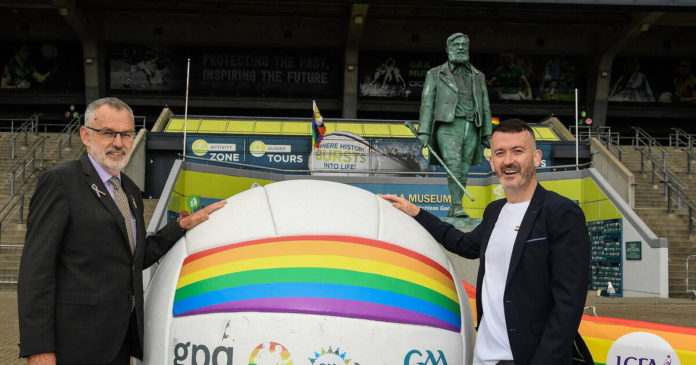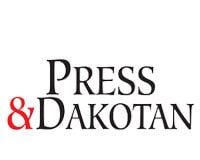
The full-time whistle sounds for Pride month later on today.
It was a month where the changing relationship between sport and the LGBTQ+ community here at home moved at different speeds.
It was a month of steps forward, taken in the company of more tuned-in sporting organisations, but also, sadly, another month of standing still.
It was a month in which Leinster scrum-half Nick McCarthy, instead of giving up on his dream, announced to anyone who would listen that he was a gay man.
It was a month in which Irish Olympic hockey player Peter Caruth shook off years of anxiety concerning his sexuality to arrive at the conclusion that the best thing he’s ever done in life was to stop hiding his true self.
Caruth and McCarthy were following a trickle of sportspeople in the UK who had made the brave decision this month and last to share their sexual orientation with a larger audience, role models such as 17-year-old Blackpool footballer Jake Daniels and Scottish football referees Craig Napier and Lloyd Wilson.
Greater visibility leads to greater ease for a not out sportsperson to follow in the footsteps of one who is, but sadly, from a GAA perspective, there is no male hurler or footballer to proudly follow after. Nor has there been for 13 years now.
Contrast this with the openness on the women’s side of the Gaelic Games house where players are happy to give an interview before a championship game on lining out against their partner, as was the case recently for Mayo footballer Fiona McHale and Tipperary captain Maria Curley.
In a column on these pages last month, former Cork footballer Valerie Mulcahy wrote that when Dónal Óg Cusack came out in October of 2009, she was “naïve in thinking it would allow for more sportsmen to come out and be accepted”.
Thirteen years on, we’re still waiting for the next Dónal Óg.
They are there, of course, a GPA survey earlier this year finding that 10% of male inter-county players are aware of an LGBTQ+ teammate (the corresponding female figure is 69%).
And for anyone who might not fully grasp the importance of having a male inter-county player do as Cusack did in 2009, have a read of what Cathal O’Sullivan has to say.
Cathal is 23 and a member of the Portlaoise GAA club. He remembers when he learned of the Cork goalkeeper’s coming out and the “fire it lit” in him.
“When someone from a community you feel so at home in comes out like that and so publicly, it gave me the realisation that there are more people out there like me. It also put in my head that this is okay, and I will be able to eventually say this out loud. Donal Óg, for all intents and purposes, changed my life,” O’Sullivan told the .
“There does need to be another male player who bites the bullet, but I’m also fully aware you can never put pressure on someone.
“It would show young lads around the country that it’s okay, you don’t have to hide yourself. Everyone comes out at their own time but being part of the GAA community adds a little bit of extra fear because there are not so many of us.”
Gemma Begley is the GPA’s first ever Equality, Diversity, and Inclusion Manager. She is seven months in the role. Work to date has centred on changing perceptions.
“Our survey highlighted that 99% of inter-county players would be supportive of an LGBTQ+ teammate if they came out. Hopefully, that is a positive message to anyone that does have reservations or feel like they wouldn’t belong or wouldn’t be welcomed at inter-county level.”
The survey also found the expectation that LGBTQ+ players would face discrimination is much lower among players who have an out teammate, at just 18%, compared with 50% among all respondents.
“From that you can read that players are having a more positive experience than would be expected and if a player has a teammate who is out, they can see them being treated normally. It is probably a lot more open, welcoming, and positive than people outside of the inter-county game realise,” Begley continued.
Where this survey, along with last weekend’s GPA Pride breakfast, was a first step in shining a light on the support that is there from the straight side of the dressing-room, future work will attempt to establish why male players don’t feel as comfortable as their female counterparts in opening up.
“I strongly believe, in the main, it’s a straight man’s problem,” Cusack told the in a recent interview, while referee David Gough remarked on Virgin Media’s last year that “a lot of young males drop out of sport very early on – particularly team sports – because they find the environment intimidating, and they find they don’t fit in.”
Cathal O’Sullivan can relate to Gough’s point. He remembers exactly where he sat the first time he entered a dressing-room after telling his Portlaoise teammates he was gay.
“I was 18 and the fear of God was in me to go into the dressing room and change before a football game,” O’Sullivan recalls.
Fearful that teammates might be odd at changing in front of him, Cathal stared down at his boots for what seemed like an age, warning himself not to look up.
“I think that comes into every young lad’s head that is a member of the LGBTQ+ community. You are saying to yourself, they are not going to want to get changed in front of me because they think I am going to be looking at them.
“I even thought about coming ready and not togging out in the dressing room because someone might say something.”
No one did say anything, O’Sullivan’s coming out experience within the GAA sphere a wholly positive one.
“Portlaoise GAA is home. Last year, we raised the Pride flag. And when I passed it every day, I was able to say, ‘we did that’.”
Education, says O’Sullivan, is vital to creating a dressing-room climate which empowers an LGBTQ+ person to be their true selves.
Cognisant of such, the GPA is looking at incorporating diversity and inclusion training into their rookie camp for inter-county newcomers.
The GAA, meanwhile, is already running diversity and inclusion workshops, equipping club officers and coaches with the terminology to ensure clubs are safe and supportive environments.
“What we are trying to do is create a space where you bring yourself, your unique qualities, and your identity to the GAA club, and that should be the same for everybody who comes through our doors,” concluded Geraldine McTavish, the GAA’s Diversity and Inclusion officer.







